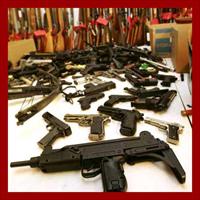BURUNDI: Government questions lack of weapons as FNL fighters assemble

Several thousand combatants of the Forces for National Liberation (FNL) have assembled at Rugazi in northwestern Bubanza Province but only a few weapons have been handed in, according to observers.
FNL spokesman Pasteur Habimana said 2,450 fighters were in Rugazi and that number would rise to 3,000 as more came in from pre-assembly areas in Bujumbura Rurale.
The rebels were required to surrender their weapons to an African Union protection unit, but only 40 weapons had been handed in, according to government spokeswoman Hafsa Mossi.
That number of weapons, she added, was very small considering the number of combatants supposed to have them. This had prompted the government to question where other arms were being kept.
In a statement issued on 25 July the government said: "All the combatants still holding weapons are considered criminals." It also criticised the FNL for failing to forward the list of its combatants to the Joint Verification and Monitoring Mechanism (JVMM), saying this was evidence the movement was still recruiting fighters in order to meet the number of 21,100 men it says it has.
"That is evidence that it [the FNL] has a hidden agenda," the statement added, noting that this violated the peace accord. The group is Burundi's last armed rebel movement.
The move to assemble fighters was welcomed by the chairman of the political directorate, Ambassador Kingsley Mamabolo. The envoy, who also represents the South African government in the mediation team, said it was an important step in the peace process.
"It opens the way to the disarmament, demobilisation and reintegration of combatants," he said in a statement. "We expect other FNL combatants to join the assembly areas in the coming days, which will be a confirmation that the peace process is really back on track."
The government representative in the mediation process, General Evariste Ndayishimiye, described it as a sign "that can contribute to get things moving forward".
Poor conditions
In Rugazi, residents said it would mark an end to harassment by FNL combatants searching for food. "If they are given food, we can attend to our daily activities without fear," a resident of Rugazi, who requested anonymity, told IRIN.
FNL combatants have regularly been accused of looting households or fields for supplies. Only combatants in assembly areas are provided with food and until 28 July, the Rugazi site was only hosting 155 combatants.
Habimana deplored the poor living conditions of combatants in the site, saying they did not have enough food, mattresses or medicine. This issue, he added, needed to be discussed in the JVMM, the body overseeing the implementation of the peace accord.
The FNL had suspended the regrouping of its combatants on 7 July, demanding recognition as a political party. However, the government objected to the legalisation of the movement unless the regrouping of combatants was realised.
It accused the group of recruiting new combatants and delaying the peace process by insisting on political recognition before cantonment. However, FNL leader Agaton Rwasa denied recruiting new combatants.
Rwasa returned to Burundi on 30 May after years of exile in Tanzania and has since denounced rebellion. Before his return, he signed an agreement with the government, committing his group to end rebellion.
The FNL last attacked Bujumbura's suburbs in May, leaving 33 people dead and at least 20,000 displaced. Observers have hailed the fact that the guns have remained silent since Rwasa's return, saying it could signal the end of conflict.
 Back and Next - Back and Next
Back and Next - Back and Next See Also - See Also
See Also - See Also